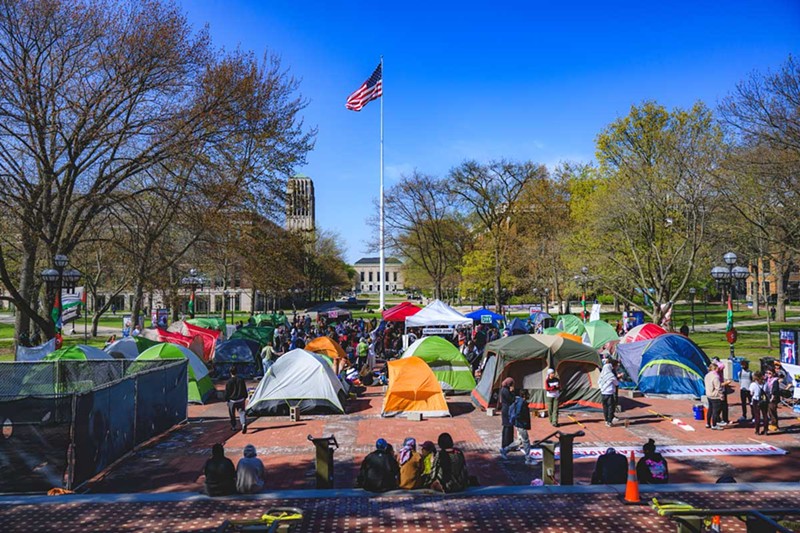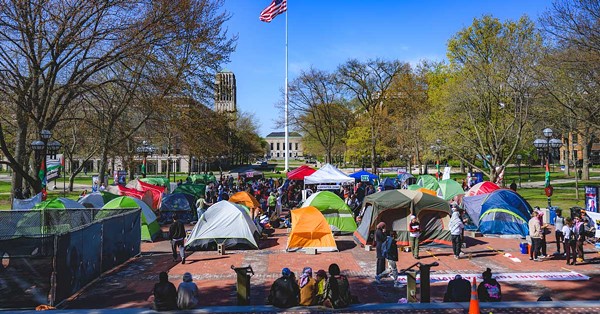
Doug Coombe
A collective of student groups that calls itself the Tahrir Coalition organized a protest encampment on the University of Michigan Diag with the aim of convincing officials to divest $6 billion from companies tied to Israel.
Michigan Attorney General Dana Nessel announced Thursday that she is filing criminal charges against nine people involved in a pro-Palestinian protest encampment at the University of Michigan in Ann Arbor.
Most of those charged are alumni and students who refused to vacate the encampment on May 21 after police ordered them to leave.
In addition, two people, including a U-M alumnus, have been charged for separate incidents during a counter-protest on April 25. One is charged with disturbing the peace and attempted ethnic intimidation, while the other faces charges of malicious destruction of personal property for allegedly breaking and discarding protestors’ flags.
Two people have been charged with trespassing, a misdemeanor punishable by up to 30 days in jail, for refusing to leave the encampment after repeated lawful orders.
An additional seven people face charges of trespassing and resisting or obstructing a police officer, a felony punishable by up to two years in prison. These charges are reserved for those who allegedly made physical contact with officers or obstructed arrests.
The charges follow an extensive examination of evidence that included body-worn camera footage, police reports, communications between university officials and local authorities, and various university policies and bylaws. The Solicitor General Division also evaluated all charges for potential First Amendment violations.
Following the review, the Attorney General’s Office declined to prosecute protesters involved in two specific incidents: the Honors Convocation on March 25 at Hill Auditorium and the protest outside the University of Michigan Museum of Art on April 22. However, the investigation into incidents at the homes of U-M Regents remains ongoing.
The charges announced Thursday stem from protest activities on the Diag, a central park area on the U-M campus, where demonstrators established an encampment in April. The encampment, which grew to approximately 60 tents, raised significant safety concerns, including fire hazards and blocked egress paths, according to the U-M fire marshal. Despite multiple meetings between university officials and student liaisons, the encampment remained in place, prompting the university to request police assistance to clear the area.
At 5:38 a.m. on May 21, police issued a dispersal order, giving demonstrators 10 minutes to vacate the area. When the order was ignored, police moved in, encountering resistance from several demonstrators who placed and threw objects to block the officers’ path, according to Nessel. During the operation, some demonstrators physically obstructed the police.
But protesters countered that police used excessive force. Officers dressed in riot gear used batons and pepper spray to drive protesters back from the encampment before tossing tents, supplies, and students’ belongings into trash containers.
A similar clash occurred at an encampment at Wayne State University in Detroit on May 30.
“There were dozens of demonstrators in this encampment that morning who promptly obeyed the officers on the scene and dispersed,” Nessel said. “For those who did not, trespassing is a 30-day misdemeanor. In this case, we charged only those who made an effort to impede the officers clearing the encampment. Resisting or Obstructing is a much more serious offense, and for the seven demonstrators we have charged with that felony, we allege that every one of them physically placed their hands or bodies against police who were conducting their duty to clear the hazardous encampment, or physically obstructed an arrest.”
Nessel emphasized that while the right to free speech and assembly is protected under the First Amendment, illegal activities will not be tolerated.
“Conviction in your ideals is not an excuse for violations of the law,” Nessel said. “A campus should not be lawless; what is a crime anywhere else in the city remains a crime on university property.”
Charges were filed Wednesday in 15th District Court in Washtenaw County, though none of the defendants have yet been arraigned, as of Thursday morning.

